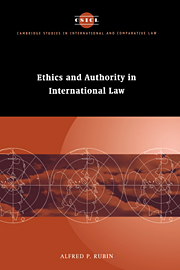Book contents
- Frontmatter
- Contents
- Preface
- Acknowledgments
- List of abbreviations
- Table of cases
- Table of statutes
- Table of treaties
- 1 Introduction
- 2 The international legal order
- 3 Theory and practice come together
- 4 Putting it together
- 5 Implications for today
- Bibliography
- Index
- CAMBRIDGE STUDIES IN INTERNATIONAL AND COMPARATIVE LAW
1 - Introduction
Published online by Cambridge University Press: 14 September 2009
- Frontmatter
- Contents
- Preface
- Acknowledgments
- List of abbreviations
- Table of cases
- Table of statutes
- Table of treaties
- 1 Introduction
- 2 The international legal order
- 3 Theory and practice come together
- 4 Putting it together
- 5 Implications for today
- Bibliography
- Index
- CAMBRIDGE STUDIES IN INTERNATIONAL AND COMPARATIVE LAW
Summary
Crime and punishment: jurisdiction to prescribe, to adjudicate and to enforce
The relationship between universal crimes and universal jurisdiction has been disputed by statesmen and lawyers for at least 3,000 years. An incident appears in a papyrus of about 1000 BC:
I [Wen-Amon, a priest of the Egyptian god Amon-Re from the temple of Karnak] reached Dor [on the coast of what is now Israel], and … a man of my ship ran away and stole one (vessel) of gold … four jars … and a sack of… silver. I got up in the morning, and went to the place where the Prince was, and I said to him: “I have been robbed in your harbor. Now you are the prince of this land, and you are its investigator who should look for my silver. Now about this silver - it belongs to Amon-Re, King of the Gods, the lord of the lands; it belongs to … my lord, and the other great men of Egypt! It belongs to you; it belongs to … the Prince of Byblos [apparently scheduled to be a recipient of the money in return for a cargo].”
Apparently, the priest took a rather imperious line, because the Prince of Dor began his response by denying the impact in Dor of the priest's assertions of eminence.
- Type
- Chapter
- Information
- Ethics and Authority in International Law , pp. 1 - 34Publisher: Cambridge University PressPrint publication year: 1997



